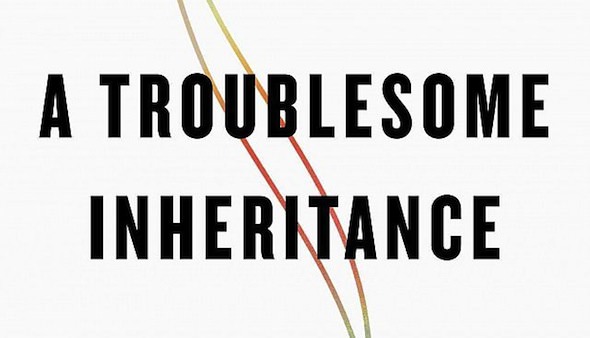|
To see long excerpts from “A Troublesome Inheritance” at Google Books, click here.
|
“A Troublesome Inheritance: Genes, Race and Human History”
A book by Nicholas Wade
Is there a topic more divisive than race? If so, perhaps it’s the pairing of science and race. After all, recent generations have seen odious prejudices exploited under the guise of scientific legitimacy to justify discrimination, sterilization and even genocide. Equally important, racial discrimination persists in profound and insidious ways around the globe.
Science journalist Nicholas Wade, an experienced reporter who has covered many advances in genetic technologies for the New York Times, saunters into this fraught political landscape undaunted. His new book, “A Troublesome Inheritance,” approaches the subject with a particular, if parochial, grievance: New scientific understanding of our genetic inheritance is increasing our understanding of differences among humans. And yet, Wade argues, political sensitivities are holding back research in this field.
“Several of the intellectual barriers erected many years ago to combat racism now stand in the way of studying the recent evolutionary past,” Wade contends. He laments, for instance, that “researchers at present routinely ignore the biology of race, or tiptoe around the subject, lest they be accused of racism by their academic rivals and see their careers destroyed.” And it clearly irks him that science should be held back by a political correctness that he sees as “shaped by leftist and Marxist political dogma, not by science.”
Wade’s argument that the subject is routinely ignored is seriously undercut by the fact that much of his book is composed of reporting about genetic research on precisely this subject. Nonetheless, the book contains much well-chosen evidence of advances in our increasingly sophisticated understanding of the human genome and population genetics. Despite the political volatility of the subject matter, it’s easy to see why Wade finds the research tantalizing: Our genetic inheritance surely does hold fascinating clues about the activities of early human populations.
Wade is particularly interested in how evolutionary forces may have operated in the relatively recent past of human civilization — over the past 3,000 years. He musters a good deal of persuasive evidence that, as he puts it, “human evolution has been recent, copious, and regional.” It stands to reason that this should be so. After all, as evolutionary biologists have shown for countless species, the geographic separation of a population over time results in adaptations to specific environments. And, for many thousands of years, most human populations were separated into diverse geographic and social settings.
Thus Wade discusses genetic research showing that a mutation on a gene named DARC (Duffy antigen receptor for chemokines) probably evolved in Africa in response to a species of malarial parasite once endemic in parts of that continent. As a result, almost everyone in Africa carries the DARC mutation — and thus has a strong defense against an ancient form of malaria, while almost no one outside the continent does. Wade also finds evolutionary forces at work in our genetic makeup that allowed many European descendants to tolerate cow’s milk while most other humans are lactose intolerant. He contends, reasonably enough, that this genetic change sprung from the advantage it conferred millennia ago on the offspring of cattle herders who occupied northern Europe.
Wade gets into trouble, however, in the latter half of the book, which he describes as more “speculative.” A whole chapter is devoted to the subject of Jewish intelligence, in which he argues that the disproportionate number of Nobel Prizes awarded to people of Jewish descent can be traced to the fact that Jewish money-lending in the Middle Ages required levels of literacy and numeracy far beyond those in the general population. That specialization, and the wealth it brought, he argues, conferred upon the Ashkenazi Jews of Europe an evolutionary advantage that became encoded in complex ways in their genes.
There is little solid evidence to support this hypothesis; moreover, the combinations of genes conferring intelligence — if there are any — are unknown. While Wade demonstrates a good deal of mastery over many of the technical issues involved, he strikes a remarkably cavalier note about the obvious social and political unease such research might engender.
Brushing aside Jews’ sensitivities to this kind of research, for instance, he blithely proclaims: “The days of pograms are past, and to ignore every difficult subject would serve only the forces of obscurantism.” And even though he offers a chapter on what he calls the “perversions of science” that led to eugenics and ultimately to the Holocaust, he never satisfyingly grapples with the reality that strictures against this type of research remain in place for a reason: namely that the science of racial differences presents an affront to our relatively fragile and hard-won political understanding (widely sanctioned internationally) that all people deserve equal treatment under the law.
In an America still struggling with glaring disparities in opportunity between whites and blacks, for instance, it is hard to know what to make of Wade’s attempt to sweep aside such issues by simply proclaiming that “fears that the evolutionary understanding of race will promote a new phase of racism or imperialism are surely exaggerated. The lessons of past abuses are still vivid enough.” Or that “opposition to racism is now well entrenched, at least in the Western world.” Despite Wade’s seeming command of the science involved, statements like these set a tone that often makes him seem like an over-eager debater so keen to score points that he ultimately loses the larger argument.
Seth Shulman, author of the syndicated monthly column “Got Science?” and a senior staff writer at the Union of Concerned Scientists, is the author of six books, including “The Telephone Gambit: Chasing Alexander Graham Bell’s Secret.”
©2014, Washington Post Book World Service/Washington Post Writers Group






You need to be a supporter to comment.
There are currently no responses to this article.
Be the first to respond.